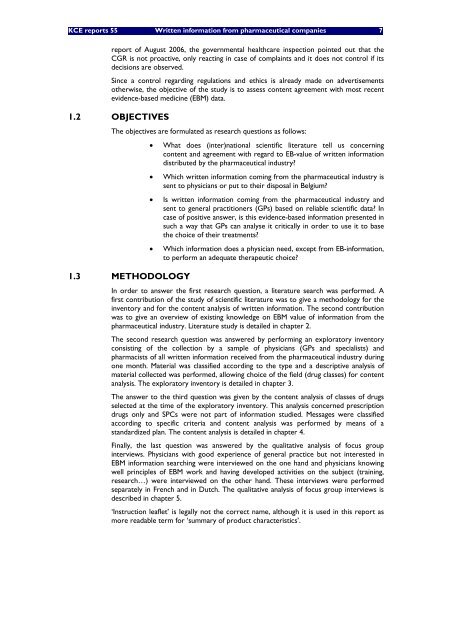Valeur en termes de données probantes des informations ... - KCE
Valeur en termes de données probantes des informations ... - KCE
Valeur en termes de données probantes des informations ... - KCE
You also want an ePaper? Increase the reach of your titles
YUMPU automatically turns print PDFs into web optimized ePapers that Google loves.
<strong>KCE</strong> reports 55 Writt<strong>en</strong> information from pharmaceutical companies 7<br />
report of August 2006, the governm<strong>en</strong>tal healthcare inspection pointed out that the<br />
CGR is not proactive, only reacting in case of complaints and it does not control if its<br />
<strong>de</strong>cisions are observed.<br />
Since a control regarding regulations and ethics is already ma<strong>de</strong> on advertisem<strong>en</strong>ts<br />
otherwise, the objective of the study is to assess cont<strong>en</strong>t agreem<strong>en</strong>t with most rec<strong>en</strong>t<br />
evid<strong>en</strong>ce-based medicine (EBM) data.<br />
1.2 OBJECTIVES<br />
The objectives are formulated as research questions as follows:<br />
1.3 METHODOLOGY<br />
• What does (inter)national sci<strong>en</strong>tific literature tell us concerning<br />
cont<strong>en</strong>t and agreem<strong>en</strong>t with regard to EB-value of writt<strong>en</strong> information<br />
distributed by the pharmaceutical industry?<br />
• Which writt<strong>en</strong> information coming from the pharmaceutical industry is<br />
s<strong>en</strong>t to physicians or put to their disposal in Belgium?<br />
• Is writt<strong>en</strong> information coming from the pharmaceutical industry and<br />
s<strong>en</strong>t to g<strong>en</strong>eral practitioners (GPs) based on reliable sci<strong>en</strong>tific data? In<br />
case of positive answer, is this evid<strong>en</strong>ce-based information pres<strong>en</strong>ted in<br />
such a way that GPs can analyse it critically in or<strong>de</strong>r to use it to base<br />
the choice of their treatm<strong>en</strong>ts?<br />
• Which information does a physician need, except from EB-information,<br />
to perform an a<strong>de</strong>quate therapeutic choice?<br />
In or<strong>de</strong>r to answer the first research question, a literature search was performed. A<br />
first contribution of the study of sci<strong>en</strong>tific literature was to give a methodology for the<br />
inv<strong>en</strong>tory and for the cont<strong>en</strong>t analysis of writt<strong>en</strong> information. The second contribution<br />
was to give an overview of existing knowledge on EBM value of information from the<br />
pharmaceutical industry. Literature study is <strong>de</strong>tailed in chapter 2.<br />
The second research question was answered by performing an exploratory inv<strong>en</strong>tory<br />
consisting of the collection by a sample of physicians (GPs and specialists) and<br />
pharmacists of all writt<strong>en</strong> information received from the pharmaceutical industry during<br />
one month. Material was classified according to the type and a <strong>de</strong>scriptive analysis of<br />
material collected was performed, allowing choice of the field (drug classes) for cont<strong>en</strong>t<br />
analysis. The exploratory inv<strong>en</strong>tory is <strong>de</strong>tailed in chapter 3.<br />
The answer to the third question was giv<strong>en</strong> by the cont<strong>en</strong>t analysis of classes of drugs<br />
selected at the time of the exploratory inv<strong>en</strong>tory. This analysis concerned prescription<br />
drugs only and SPCs were not part of information studied. Messages were classified<br />
according to specific criteria and cont<strong>en</strong>t analysis was performed by means of a<br />
standardized plan. The cont<strong>en</strong>t analysis is <strong>de</strong>tailed in chapter 4.<br />
Finally, the last question was answered by the qualitative analysis of focus group<br />
interviews. Physicians with good experi<strong>en</strong>ce of g<strong>en</strong>eral practice but not interested in<br />
EBM information searching were interviewed on the one hand and physicians knowing<br />
well principles of EBM work and having <strong>de</strong>veloped activities on the subject (training,<br />
research…) were interviewed on the other hand. These interviews were performed<br />
separately in Fr<strong>en</strong>ch and in Dutch. The qualitative analysis of focus group interviews is<br />
<strong>de</strong>scribed in chapter 5.<br />
‘Instruction leaflet’ is legally not the correct name, although it is used in this report as<br />
more readable term for ‘summary of product characteristics’.

















